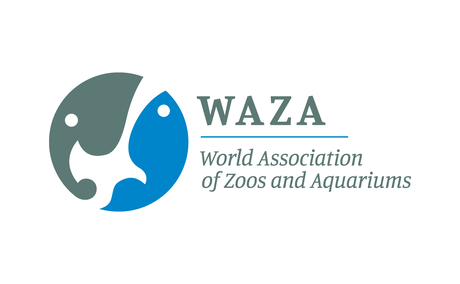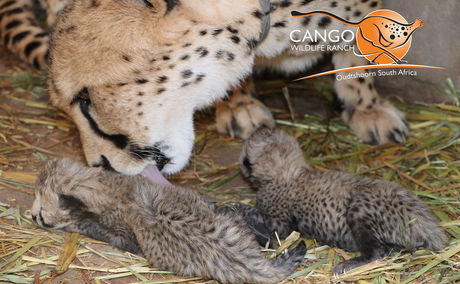Watch Bonk bring us the BEST news! Enough to make lock-down restrictions a little bit less scary. "At this time, we would like to highlight the immensely valuable role that this institution plays in terms of wildlife conservation, sustainability and education, as well as in its impact on the local economy."
Cango Wildlife Ranch Delivers Missing Information Critical to Sustaining Biodiversity
Despite volumes of data currently available on mankind, it is surprising how little we know about other species. A paper published this week in the journal Proceedings of the National Academy of Sciences (PNAS) – using data recorded by Cango Wildlife Ranch in collaboration with other zoos and aquariums worldwide - confirms that critical information, such as fertility and survival rates, is missing from global data for more than 98 percent of known species of mammals, birds, reptiles, and amphibians.
It’s a gap with far-reaching implications for conservationists seeking to blunt the impact of mass extinctions. At a minimum, scientists working worldwide on behalf of IUCN Red List, IUCN Species Survival Commission, Convention on International Trade in Endangered Species of Flora and Fauna (CITES), TRAFFIC, Monitor, and others require more complete data to make informed decisions.
That changed when researchers added data from a previously untapped source, the Zoological Information Management System (ZIMS). Across classes of species, key blanks fill with salient data. Cango Wildlife Ranch records their animal data in ZIMS, which is curated by wildlife professionals working within zoos, aquariums, refuge, research, and education centers in 97 countries. It is maintained by Species360, a non-profit member-driven organization that facilitates information sharing among its nearly 1,200 institutional members, and is the world’s largest set of wildlife data. Cango Wildlife Ranch has been contributing data on their animals since 2001. Since then, they have added data on 2127 birds, reptiles, amphibians, and mammals of 189 species, making a huge impact on the understanding of those species’ life histories.

“It seems inconceivable. Yet scientists tasked with saving species often have to power through with best-guess assumptions that we hope an approximate reality,” said lead researcher and Species360 Conservation Science Alliance director Dalia A. Conde.
A multidisciplinary team led by Species360 Conservation Science Alliance, with participants from 19 institutions, believes we can substantially increase what we know by applying new analytics to data that has been long overlooked – using data contributed by Cango Wildlife Ranch and other zoos and aquariums around the world. “Providing that missing data – filling in those gaps – is game-changing for these species,” adds the director of Cango Wildlife Ranch.
Predicting when species are at risk, and how best to bolster populations, requires knowing at what age females reproduce, how many hatchlings or juveniles survive to adolescence, and how long adults live. To understand what data are currently available, and to measure the void, researchers developed a Species Knowledge Index (SKI) that classifies available demographic information for 32,144 known species of mammals, birds, reptiles, and amphibians.
"The demographic knowledge of species index provides significant information that, in conjunction with genetic data, allows estimations of events that affect population viability. Severe population declines, sometimes called genetic bottlenecks, influence the sustainability of populations, as we have found in studying endangered rhinos,” said Oliver Ryder, Ph.D., Director of Genetics, San Diego Zoo Global.
Turning first to go-to global sources of information, the index registers comprehensive birth and death rates for just 1.3 percent of these major classes of species. The map, which illustrates demographic knowledge for individual species, shows that many remain blank.
“Adding ZIMS was like turning on the lights in an otherwise very dim room,” said Conde. “Class by class, from mammals through amphibians, we saw large gaps fill with fundamental data needed to help conservationists assess populations and advocate for threatened, endangered, and vulnerable species.”
Incorporating ZIMS boosted the Species Knowledge Index eightfold for comprehensive life table information used to assess populations. Information on the age of first reproduction for females, a key piece to estimating how a population will fair in coming years, grew as much as 73 percent.
The study, “Data gaps and opportunities for comparative and conservation biology,” suggests a value far beyond the data itself. As Conservation Science Alliance and other researchers apply analytics to data aggregated across global sources, including ZIMS, they glean insights that impact outcomes for species in danger of extinction. Moreover, this can provide key insights for comparative and evolutionary biology, such as understanding the evolution of aging.
The team of 33 scientists including data analysts, biologists, and population dynamics specialists developed the first Species Knowledge Index to map just how much we know about species worldwide. The index aggregates analyzes and maps data from 22 databases and the IUCN Red List of Threatened species.
About Species360
Species360, a non-profit NGO and global leader in wildlife care and conservation, mobilizes a network of more than 1,100 zoo, aquarium, university, research and governmental members worldwide to improve animal welfare and species conservation. Our members address today’s most urgent wildlife issues, including establishing best practices in husbandry, enrichment, medical care, welfare, reproduction, population management, and biodiversity.
Together, Species360 members curate the Zoological Information Management System (ZIMS), the world’s most comprehensive open database of knowledge on more than 22,000 species. ZIMS vastly increases what is known about thousands of species, and is instrumental in identifying sustainability strategies for many of the species assessed as vulnerable, endangered, and extinct in the wild.
From data to applied conservation
Species360 Conservation Science Alliance researchers provide conservationists with evidence-based findings integrating the full scope of global data, including IUCN Red List, CITES, TRAFFIC, EDGE, AZE, ZIMS, and more. Research led in collaboration with IUCN Species Survival Commission, CITES, and others, drives insightful decisions on many levels, from enforcing illegal wildlife trade laws to calculating the viability of insurance populations.
Further Reading
Nothing brings joy like the pitter-patter of new life, which is exactly what the Cango Wildlife Ranch family has been spoilt with this summer! Three animal families have welcomed new life into the world, and the team couldn’t be happier.
Our biggest sale of the year is HERE! Ons grootste uitverkoping van die jaar is HIER! 50% DISCOUNT on annual tickets 50% afslag op Jaar kaartjies

















Share This Post